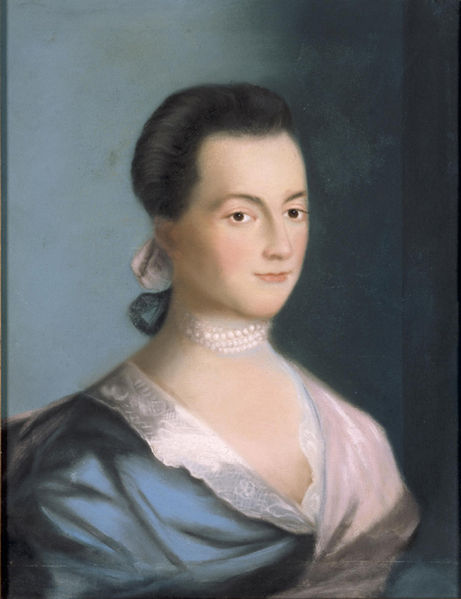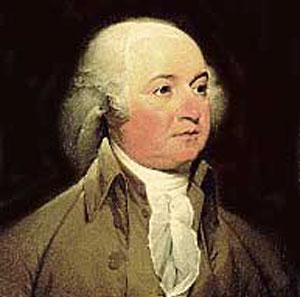|
|
Online Texts for Craig White's Literature Courses
|
|
|
|
|
Letters of
Abigail & John Adams
on the Declaration of Independence
& Women's Rights
(compare
Letters by Abigail & John
Adams + a journal note on Benjamin Franklin)
![]()
Instructor's
note:
These letters between the man and woman who would become the USA's second
president and second first lady (and parents of the nation's sixth president,
John Quincy Adams) are interesting to modern readers for historical and literary
reasons.
Historical:
The nation's "Founding Fathers" and other leaders of the
Enlightenment / Age of Reason were predominantly male, and the
Declaration of Independence says that "all men are created equal," but
Abigail Adams makes an appeal that women should have voice and representation in
democratic government, anticipating the 1848
Declaration of Sentiments of the Seneca Falls Women's Rights Convention and
the 19th Amendment to the
U.S. Constitution that in 1920 granted women the right to vote.
John Adams's reply to
Mrs. Adams's letter, though possibly teasing and dismissive, reveals some of the
conservative pressures the new American government was under. Specifically, if
American citizens (then limited to affluent white men) rebelled against the King
of England, then othersóchildren, apprentices, Indians, and "negroes"ówould
follow their model and rebel against affluent white men.
Literary:
The Adamses enjoyed a long "model marriage" or "marriage of equals," and this
private exchange of personal letters captures some of the flavor of private life
as represented more often by fiction, which represents for readers the private
lives and inner thoughts of people joined not by rational government (as in the
Declaration or the Constitution) but by emotional bonds of love, friendship,
loyalty.
Discussion questions:
1. What does Mrs. Adams's
original letter tell us about the limits and possibilities of women's political
expression and participation in the early American republic?
2. How much do these
private letters evoke (however minimally) some of the pleasures of literary
fiction? What does this tell us about what we regard as literature, assuming
that most of us don't regard the Constitution and Declaration as literature?
![]()
31 MARCH 1776
ABIGAIL ADAMS TO JOHN ADAMS
"I long to hear that you have declared an independency. And, by the way, in the new code of laws which I suppose it will be necessary for you to make, I desire you would remember the ladies and be more generous and favorable to them than your ancestors.
"Do
not put such unlimited power into the hands of the husbands.
"Remember, all men would be tyrants if they could. If particular care and attention is not paid to the ladies, we are determined to foment a rebellion, and will not hold ourselves bound by any laws in which we have no voice or representation.
"That your sex are naturally tyrannical is a truth so thoroughly established as to admit of no dispute; but such of you as wish to be happy willingly give upóthe harsh title of master for the more tender and endearing one of friend.
"Why, then,
not put it out of the power of the vicious and the lawless to use us with
cruelty and indignity with impunity?
"Men of sense
in all ages abhor those customs which treat us only as the (servants) of your
sex; regard us then as being placed by Providence under your protection, and in
imitation of the Supreme Being make use of that power only for our happiness."
![]()
14 APRIL 1776
JOHN ADAMS TO ABIGAIL ADAMS
"As to your extraordinary code of laws, I cannot but laugh.
"We have been told that our struggle has loosened the bonds of government everywhere; that children and apprentices were disobedient; that schools and colleges were grown turbulent; that Indians slighted their guardians, and negroes grew insolent to their masters.
"But your letter was the first intimation that another tribe, more numerous and powerful than all the rest, were grown discontented.
"This is rather too coarse a compliment, but you are so saucy, I won't blot it out.
"Depend upon it, we know better than to repeal our masculine systems. Although they are in full force, you know they are little more than theory. We dare not exert our power in its full latitude. We are obliged to go fair and softly, and, in practice, you know we are the subjects.
"We have only the name of masters, and rather than give up this, which would completely subject us to the despotism of the petticoat, I hope General Washington and all our brave heroes would fight."
![]()
7 MAY 1776
ABIGAIL ADAMS TO JOHN ADAMS
"I cannot say that I think you are very generous to the ladies; for, whilst you are proclaiming peace and good-will to men, emancipating all nations, you insist upon retaining an absolute power over wives.
"But you must remember that arbitrary power is like most other things which are very hard, very liable to be broken; and, notwithstanding all your wise laws and maxims, we have it in our power, not only to free ourselves, but to subdue our masters, and without violence, throw both your natural and legal authority at our feet."




